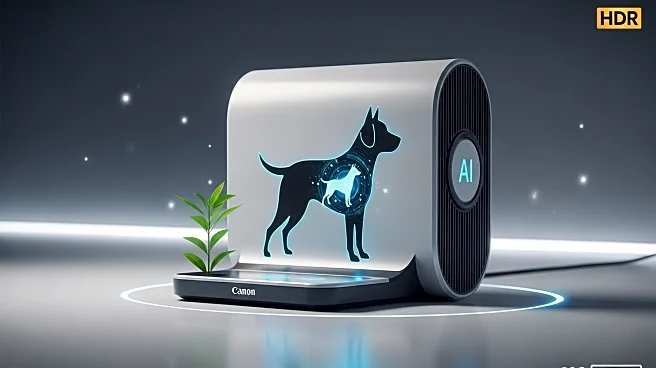What's Happening?
SpotitEarly, a biotech company, is pioneering a unique method for early cancer detection by combining the olfactory capabilities of trained dogs with artificial intelligence. The company, part of Startup Battlefield at TechCrunch Disrupt 2025, has developed an at-home cancer test that analyzes human breath samples. The test employs 18 trained beagles to detect cancer-specific odors, with the dogs' behavior validated by SpotitEarly's AI platform. The company's research, published in Nature's Scientific Reports, demonstrated a 94% accuracy rate in detecting early-stage cancers, including breast, colorectal, prostate, and lung cancer. SpotitEarly, founded in Israel in 2020, has recently launched into the U.S. market with $20.3 million in funding, aiming to expand its clinical studies and make its screening kits available through a physicians' network.
Why It's Important?
SpotitEarly's innovative approach to cancer detection could significantly impact the healthcare industry by providing a more accessible and cost-effective method for early diagnosis. The use of trained dogs and AI offers a novel solution that could complement existing screening methods, potentially leading to earlier interventions and improved patient outcomes. The company's entry into the U.S. market and its competitive pricing strategy may challenge existing players like Grail, which offers the Galleri test at a higher cost. This development could democratize access to cancer screening, making it more affordable for a broader population and potentially reducing healthcare costs associated with late-stage cancer treatments.
What's Next?
SpotitEarly plans to expand its clinical studies, starting with individual tests for breast cancer, followed by other targeted cancers. The company aims to make its at-home screening kits available to consumers through a network of physicians next year. The pricing strategy is designed to be competitive, with a single cancer test priced at around $250 and additional screenings costing less. As SpotitEarly continues to develop its technology and expand its market presence, it may face regulatory challenges and competition from established players. However, its unique approach and focus on accessibility could drive adoption and influence future cancer screening practices.
Beyond the Headlines
The integration of trained dogs and AI in medical diagnostics raises interesting ethical and cultural considerations. The reliance on animals for health-related purposes highlights the importance of humane treatment and the role of animals as companions and workers. Additionally, the use of AI in validating the dogs' behavior underscores the growing intersection of technology and healthcare, prompting discussions about data privacy, accuracy, and the potential for AI to enhance human capabilities in medical settings.










